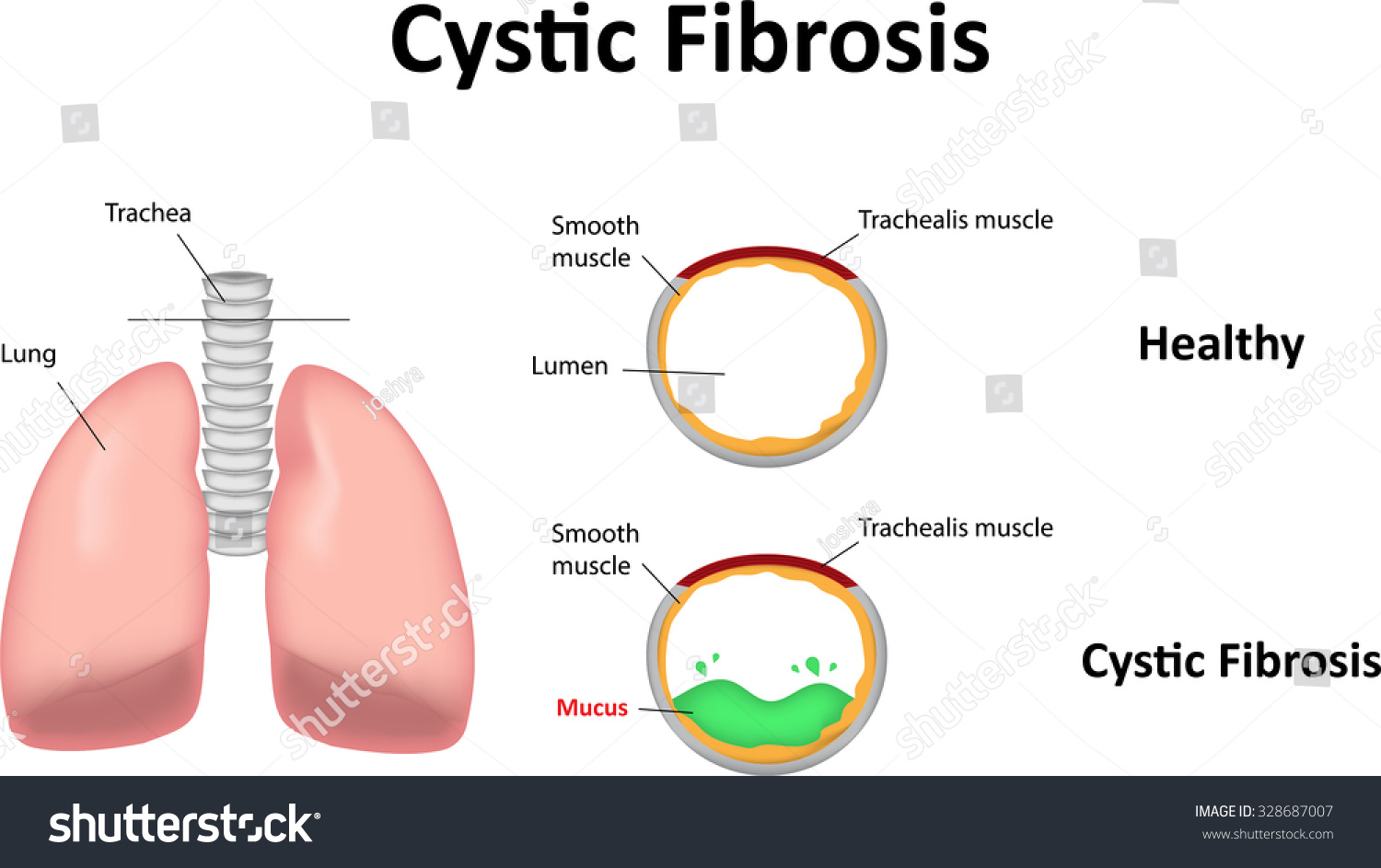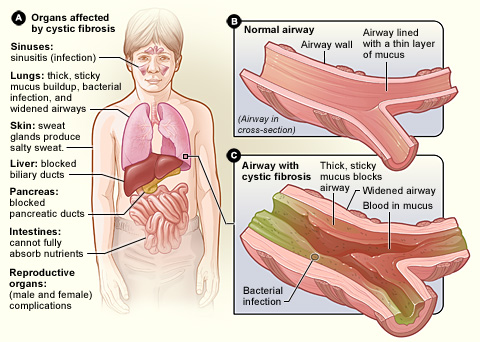What Causes Cystic Fibrosis?
It’s not contagious. It’s caused by a mutation (change) in a single gene called the Cystic Fibrosis Transmembrane Conductance Regulator (CFTR). This controls the flow of salt and fluids in and out of your cells. If the CFTR gene doesn’t work like it should, a sticky mucus builds up throughout your body.
To get CF, you have to inherit a mutated copy of the gene from both your parents.
If you only inherit one, you won’t have any symptoms. But you’ll be a “carrier” of the disease. That means there’s a chance you could pass it on to your own child one day.
About 10 million Americans are CF carriers. Every time two CF carriers have a baby, there’s a 25% (1 in 4) chance that their baby will be born with CF.

Which Parts of the Body Does CF Affect?

The lungs aren’t the only part of the body that’s harmed by CF. The disease also affects the following organs:
Pancreas: The thick mucus caused by CF blocks ducts in your pancreas. This stops digestive enzymes (proteins that break down your food) from reaching your intestine. As a result, your body has a hard time absorbing the nutrients it needs. Over time, this can also lead to diabetes.
Liver: If the tubes that remove bile become clogged, your liver gets inflamed and severe scarring (cirrhosis) occurs.
Small intestine: Because breaking down high-acid foods that come from the stomach is a challenge, the lining of the small intestine can erode.
Large intestine: Thick secretions (liquids) in your stomach can make feces (poop) very thick. This can cause blockages. In some cases, the intestine may also start to fold in on itself like an accordion (called “intussusception”).
Bladder: Chronic coughing weakens the bladder muscles. Almost 65% of women with CF have what’s called “stress incontinence.” This means that you leak urine when you cough, sneeze, laugh, or lift something. Though more common in women, men can have it, too.
Kidneys: Some people with CF get kidney stones. These small, hard mineral deposits can cause nausea, vomiting, and pain. If ignored, they can lead to a kidney infection.
Reproductive organs: Excess mucus affects fertility in both men and women. Most men with CF have problems with the tubes that transport their sperm, or what’s called the “vasa deferentia.” Women with CF have very thick cervical mucus, which can make it harder for a sperm to fertilize an egg.
Other parts of the body: CF can also lead to thinning of the bones (osteoporosis) and muscle weakness. Because it upsets the balance of minerals in the blood, it can also bring about low blood pressure, fatigue, a fast heart rate, and a general feeling of weakness.
Although CF is a severe condition that needs daily care, many treatments for it have improved. People who have CF live much longer than they used to and the quality of life has improved as well.
Treating complications
Serious cystic fibrosis problems or complications occur when the respiratory system or digestive system becomes damaged. Most people who have complications will need to stay in the hospital. Treatment for complications may include medicines or surgery, depending on the person’s age and symptoms.
The doctor may do tests, such as a chest X-ray, to know what kinds of problems your child is having.
Other treatments for complications from cystic fibrosis may include:
- Blood transfusions and medicines to treat the bleeding (embolization therapy), if your child is coughing up large amounts of blood. Coughing up small amounts of blood is normal for people who have cystic fibrosis. But coughing up large amounts of blood can be life-threatening.
- Placement of a semipermanent intravenous (IV) tube to give your child antibiotics frequently without having to place a line in the vein each time.
Home care for cystic fibrosis
Home treatment is very important. It can make a person with cystic fibrosis feel better and live longer. Here are some things you can do at home, or help your child do, to help prevent more serious health problems like lung infections:
- Don’t smoke. And avoid secondhand smoke.
- Use airway clearance techniques, such as postural drainage and chest percussion.
- Eat nutritious, high-calorie foods.
- Exercise.
- Drink plenty of fluids.
- Add salt to foods, especially during hot weather.
- Get all recommended vaccines and practice good hygiene. Also keep clean any breathing equipment you use for your treatment.
As children with cystic fibrosis get older, it is important for them to learn how to help care for themselves. Even though it can be hard to follow a treatment plan every day, there are many benefits of home treatments. Skipping a treatment may not make a person feel worse right away. But it raises the chances of having more serious problems later.

Post a comment